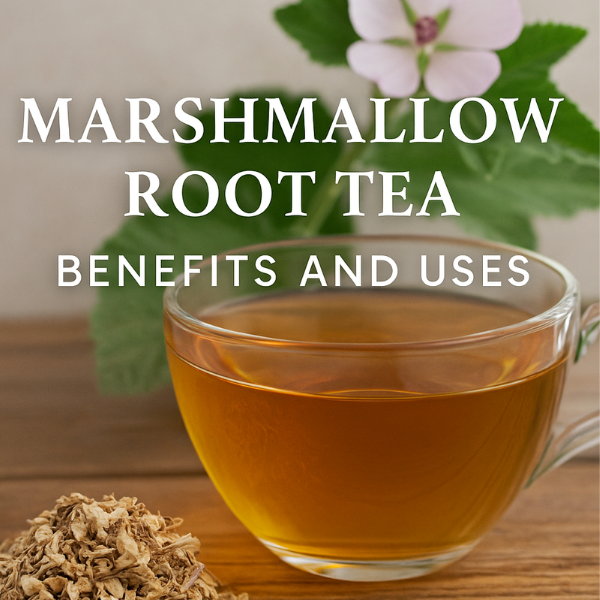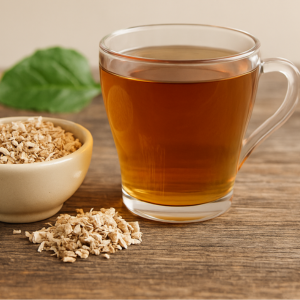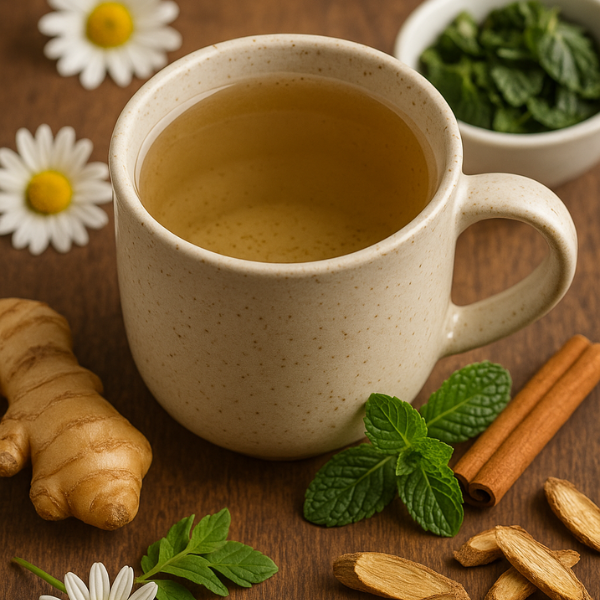Marshmallow Root Tea Benefits and Uses: The Soothing Herbal Remedy for Gut and Throat Health

If you’ve ever struggled with digestive issues, sore throats, or irritated skin, marshmallow root tea might just be one of nature’s most gentle and healing herbal allies.
Unlike the sugary marshmallows we toast over campfires, the marshmallow plant (Althaea) is a time-tested medicinal herb used for thousands of years to soothe, heal, and protect the body from inflammation.
Known for its softening, cooling, and coating properties, marshmallow root has been used in traditional medicinal practices to calm everything from sore throats to heartburn, bladder irritation, and inflamed skin. In this post, we’ll explore what marshmallow root tea is good for, how it supports gut health, its connection to IBS relief, safe daily usage, potential side effects, and how to brew a nourishing cup at home.
🌿 What Is Marshmallow Root and What Is Marshmallow Root Tea Good For?
Marshmallow root comes from the perennial herb Althaea officinalis, a beautiful flowering plant native to Europe, North Africa, and Western Asia. Its name “Althaea” comes from the Greek word altho, meaning “to heal.”
For centuries, herbalists have used marshmallow’s roots and leaves for their mucilaginous (gel-like) texture, which creates a soothing coating when mixed with water. This thick, slippery compound helps calm inflammation in the mucous membranes of the body — especially those lining the digestive tract, respiratory system, and urinary tract.
When the dried root is steeped in hot water, it releases a silky, soothing infusion known as marshmallow root tea.
This mild-tasting tea has a slightly sweet, earthy flavor and is best known for the following benefits:
🌸 Top Benefits of Marshmallow Root Tea
-
Soothes the Digestive Tract:
Marshmallow root acts as a gentle demulcent — coating the stomach and intestines with a protective film that eases irritation from acid reflux, gastritis, or ulcers. -
Eases Coughs and Sore Throats:
Thanks to its mucilage content, marshmallow tea provides natural relief from sore throats, dry coughs, and even bronchitis by calming inflammation and moisturizing the throat. -
Supports Urinary and Bladder Health:
Traditionally used as a natural remedy for UTIs, marshmallow root helps reduce irritation in the bladder and urinary tract lining. -
Promotes Skin Healing:
Its anti-inflammatory and hydrating properties can support skin repair from eczema, burns, and minor wounds — both internally (via tea) and externally (as a compress). -
Acts as a Gentle Detoxifier:
Marshmallow root may support kidney function and help the body flush out toxins through improved urination and reduced inflammation. -
Supports Heartburn and Acid Reflux Relief:
By coating the esophagus, marshmallow tea helps minimize burning sensations associated with acid reflux and GERD.
🩺 Is Marshmallow Root Good for IBS? Does Marshmallow Root Heal Your Gut?

One of the most searched questions about this herb is whether marshmallow root helps with IBS (Irritable Bowel Syndrome) — and the answer is encouraging.
🌿 How It Helps IBS and Gut Inflammation
Marshmallow root tea has demulcent and anti-inflammatory properties that can help soothe irritation in the gut lining, a major issue for those dealing with IBS, leaky gut syndrome, gastritis, or ulcerative colitis.
Its mucilage acts as a protective barrier, coating the intestinal walls and reducing contact between irritants (like stomach acid or spicy foods) and the gut tissue.
It doesn’t “heal” the gut overnight, but it creates an environment for healing by calming inflammation and reducing discomfort — allowing the gut lining to repair naturally over time.
Many people with IBS experience bloating, cramps, or alternating constipation and diarrhea. Drinking marshmallow tea regularly may help by:
-
Softening the digestive process
-
Reducing spasms and irritation
-
Supporting hydration in the gut
-
Easing bowel movement consistency
🌸 A Natural Gut Healer
Think of marshmallow root as a cooling balm for your gut.
Just as aloe vera soothes the skin, marshmallow’s mucilage soothes the internal tissues of your digestive tract. When used as part of a holistic approach — including stress management, gentle exercise, and an anti-inflammatory diet — it can significantly improve digestive comfort and balance.
☕ How Many Cups of Marshmallow Root Tea Should You Drink Per Day?
Moderation is key when it comes to herbal teas.
For most adults, 1 to 2 cups of marshmallow root tea per day is considered safe and effective for general wellness.
🌿 Suggested Use:
-
For digestive support: 1 cup before meals or between meals.
-
For sore throat or cough: Sip 1 cup 2–3 times a day while symptoms persist.
-
For urinary health: 1–2 cups daily to reduce irritation or inflammation.
Because marshmallow root coats the stomach and may slow absorption of certain medications, it’s best to drink your tea 1–2 hours apart from any prescriptions or supplements.
If you’re using marshmallow tea long-term, take short breaks every few weeks to allow your body to rebalance naturally.
⚠️ Side Effects of Marshmallow Root Tea
While marshmallow root is generally safe, there are a few things to keep in mind before adding it to your daily routine.
Possible Side Effects:
-
May Lower Blood Sugar:
Mucilage in marshmallow root can slightly lower blood glucose levels, so people with diabetes or hypoglycemia should monitor levels carefully. -
Can Interfere with Medication Absorption:
Because of its coating effect, marshmallow root may delay how quickly medications or nutrients are absorbed. Always take it a few hours apart from prescriptions. -
Potential Allergic Reactions:
Rarely, some people may experience skin rash or stomach upset. Start with a small amount and observe how your body responds. -
Not Recommended for Pregnancy or Nursing (Without Supervision):
While not known to be toxic, the effects during pregnancy haven’t been well-studied, so it’s best to consult your healthcare provider.
📜 Health Disclaimer
Disclaimer:
The information in this article is for educational purposes only and should not replace professional medical advice, diagnosis, or treatment.
Always consult your healthcare provider before using marshmallow root tea or any herbal supplement — especially if you are pregnant, nursing, taking medications (particularly for diabetes, blood pressure, or thyroid), or managing chronic health conditions.
Natural remedies can be powerful and effective, but they should always be used responsibly and with guidance when needed.
🍵 Marshmallow Root Tea Recipe
Here’s how to make a soothing cup of Marshmallow Root Tea at home — using dried roots, hot water, and optional flavor add-ins.
🌿 Ingredients:
-
1 tablespoon dried marshmallow root (or 1 tea bag)
-
1 ½ cups filtered water
-
Optional add-ins:
-
1 teaspoon raw honey (for sweetness and throat relief)
-
1 slice fresh ginger (for digestive warmth)
-
½ teaspoon lemon juice (for a touch of brightness)
-
🫖 Instructions:
1. Warm the Water (Don’t Boil It):
Heat your water until it’s warm — not boiling (around 160–180°F). Boiling water can break down some of the mucilage properties that make marshmallow so soothing.
2. Add the Root:
Place the marshmallow root in a teapot, infuser, or heat-safe jar. Pour the warm water over it.
3. Steep Slowly:
Let it steep for 10–15 minutes (for a light tea) or up to 30–60 minutes (for a thicker, more mucilaginous brew). The longer it steeps, the more soothing gel forms in your tea.
4. Strain and Enjoy:
Strain the liquid through a fine mesh sieve or cheesecloth into your favorite mug. Add honey or lemon if desired.
🧊 Optional: Cold Infusion Method
For a gentler and more mucilage-rich version:
-
Place 2 tablespoons dried marshmallow root in a quart jar.
-
Fill with cool filtered water.
-
Cover and steep overnight (8–12 hours) at room temperature.
-
Strain in the morning and enjoy cold or gently warmed.
💚 This version is especially beneficial for IBS, gastritis, or reflux, as it preserves the full mucilage content that coats the gut lining.
🪴 Flavor Profile & Pairing Ideas

Marshmallow root tea has a mild, slightly earthy and sweet flavor with a subtle hint of vanilla or wood.
To make it more enjoyable, try pairing it with:
-
Chamomile or lemon balm: for relaxation
-
Ginger: for digestive warmth
-
Peppermint: for freshness and added gut support
-
Cinnamon: for anti-inflammatory benefits and sweetness
-
Licorice root: for an extra soothing throat blend (avoid if you have high blood pressure)
🌼 Traditional Medicinal Uses of Marshmallow Root
Historically, marshmallow root has been cherished across many cultures:
-
Ancient Egyptians used marshmallow extract to soothe sore throats and wounds.
-
Greek and Roman physicians prescribed it for coughs, stomach ailments, and burns.
-
European herbalists in the Middle Ages brewed it for bronchitis, asthma, and digestive discomfort.
-
In Ayurvedic and traditional Western herbalism, it’s known as a cooling, moistening herb used to balance inflammation and dryness in the body.
Today, herbalists still recommend marshmallow for:
-
Gastritis and ulcers
-
Heartburn
-
Dry cough or throat irritation
-
Urinary tract discomfort
-
Skin healing (applied as a poultice or compress)
🧠 Science-Backed Benefits
Modern studies are beginning to confirm what traditional healers have known for centuries:
-
Anti-inflammatory effects: Research shows marshmallow extract can reduce inflammation in the gut and respiratory tract.
-
Mucilage content: Forms a protective coating over mucous membranes, reducing irritation.
-
Wound healing: Topical use may promote faster skin regeneration and collagen production.
-
Antioxidant activity: Helps combat oxidative stress and supports immune resilience.
While human clinical trials are still limited, the early results are promising — especially for those seeking gentle, plant-based remedies for chronic inflammation and digestive issues.
🕊️ When to Drink Marshmallow Root Tea
Because of its calming and restorative properties, you can enjoy marshmallow tea any time of day, but here are some timing tips:
-
Morning: To prepare and protect your digestive tract before eating breakfast.
-
Afternoon: As a gentle mid-day tonic for hydration and gut comfort.
-
Evening: Warm and soothing before bed, especially if you suffer from reflux or dry cough.
💧 Storage and Shelf Life
-
Dried root: Store in an airtight container away from moisture and sunlight; lasts up to 1 year.
-
Prepared tea: Can be refrigerated for 24–48 hours. If making a cold infusion, store in a glass jar and shake before serving.
🌸 Final Thoughts: A Gentle Healer from Nature
Marshmallow root tea is one of those quiet, comforting herbal remedies that work slowly but deeply. It doesn’t stimulate or jolt the body — instead, it nourishes, soothes, and restores balance.
If you struggle with digestive discomfort, acid reflux, sore throat, or chronic inflammation, a daily cup of marshmallow tea may become your favorite natural ritual.
It’s a wonderful example of how God’s creation provides gentle, effective healing through plants — a reminder that sometimes the simplest remedies can bring the most peace and relief.
You may also like these recipes:
